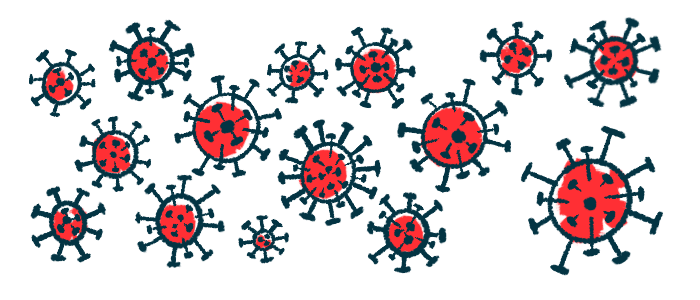Genetic data suggest causal link between COVID-19, NMOSD
Findings aid to better understanding of autoimmune disease during pandemic
Written by |

People with a genetic makeup that causes them to be more susceptible to COVID-19 are nearly five times as likely to develop neuromyelitis optica spectrum disorder (NMOSD) associated with antibodies against aquaporin-4 (AQP4), a study finds.
Evidence for a cause and effect, or causal, link between COVID-19 and NMOSD is “compelling” and contributes to “understanding of the prevention, diagnosis, treatment, and potential [disease mechanisms] of NMOSD during the COVID-19 pandemic,” the researchers wrote in “COVID-19 and the risk of neuromyelitis optica spectrum disorder: a Mendelian randomization study,” which was published in Frontiers in Immunology.
NMOSD is an autoimmune disease that features inflammation of the optic nerve, which connects the eyes to the brain, and the spinal cord. What causes it is unclear, but most people with NMOSD test positive for anti-AQP4 antibodies that can trigger an immune attack against healthy nervous system cells.
The presence of these self-reactive antibodies alone isn’t sufficient to trigger NMOSD, however, and the evidence suggests other triggers may contribute to the disease.
It’s thought that SARS-CoV-2, the virus causing COVID-19, can enter the brain and trigger damage similar to what occurs in NMOSD. “A growing body of case reports or series has documented the emergence of NMOSD subsequent to COVID-19 infection or COVID-19 vaccination,” the researchers wrote.
Link between COVID-19, NMOSD
While it seems like there is a clear connection in time, it’s unclear if COVID-19 actually causes or just triggers existing — but not yet manifest — NMOSD. “Clarifying the causal relationship between them is urgent in the COVID-19 era,” wrote a team of researchers in China who used Mendelian randomization, a method that draws on genetic data to seek a causal link between an exposure (in this case, getting COVID-19) and an outcome (developing NMOSD).
The researchers sourced genetic data from 159,840 people who tested positive for SARS-CoV-2 and more than 2.5 million noninfected people, who served as controls. All the data was available in the COVID-19 Host Genetics Initiative. Most people were of European ancestry.
They particularly looked at gene variations known to make people more susceptible to COVID-19, to require hospitalization due to an infection, or to have more severe COVID-19 disease. These variations were used as proxies of these exposures.
The presence of these gene variants was then examined in 215 people with NMOSD, including 132 who tested positive for anti-AQP4 antibodies and 83 who tested negative, and 1,244 healthy people. All were of European ancestry. The researchers then looked at potential associations between genetically determined COVID-19-related exposures and NMOSD.
Increased susceptibility, higher risk
They found that a genetically predicted higher susceptibility to COVID-19 was significantly associated with a five times higher chance of developing AQP4-related NMOSD. No significant associations were found between COVID-19 susceptibility and a higher likelihood of developing overall NMOSD and NMOSD not linked to anti-AQP4 antibodies.
There was also no evidence to support a causal link between genetically determined COVID-19 hospitalization or more severe COVID-19 and NMOSD, both with or without anti-AQP4 antibodies.
Sensitivity analyses resulted in findings that were “consistent with the primary results,” the researchers wrote, adding they “further strengthen the robustness and consistency of [Mendelian randomization] results.”
Moreover, when gene variants linked to other autoimmune and inflammatory diseases were eliminated from the analysis, a significant link between COVID-19 susceptibility and AQP4-related NMOSD was shown.
These findings “provide strong evidence” that “genetically predicted COVID-19 susceptibility [is] associated with a high risk of [AQP4-related NMOSD],” wrote the researchers, who called for more research.






